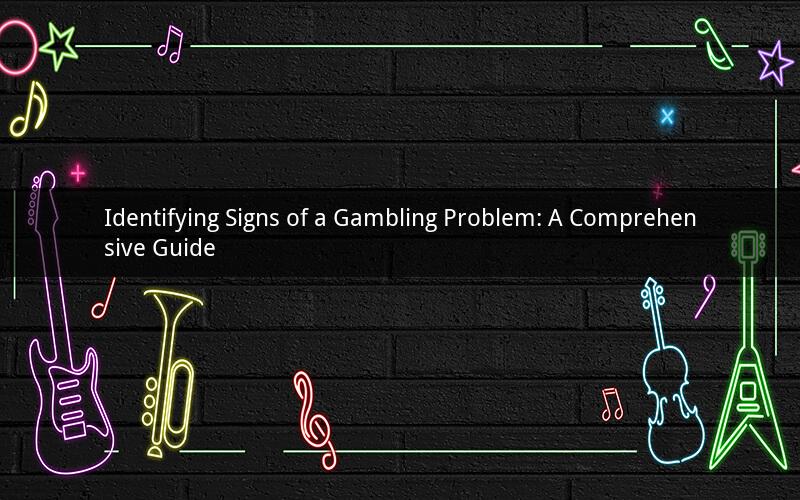
Introduction:
Gambling can be an enjoyable pastime for many, but it can quickly turn into a destructive addiction for others. Recognizing the signs of a gambling problem is crucial in order to provide support and assistance to those in need. In this article, we will explore various indicators that someone may have a gambling problem, along with ways to address and overcome it.
1. Frequent and Unexplained Financial Troubles:
One of the most apparent signs of a gambling problem is persistent financial difficulties. If someone is constantly borrowing money, overspending, or experiencing debt, it may indicate a gambling addiction. They may hide their spending habits or make excuses for their financial struggles.
2. Preoccupation with Gambling:
Individuals with a gambling problem often become obsessed with the activity. They may constantly think about gambling, plan their next betting session, or feel restless and irritable when they are not able to gamble. This preoccupation can interfere with their daily responsibilities, relationships, and overall well-being.
3. Secretive Behavior:
People with a gambling problem may become secretive about their activities. They may hide their gambling habits from family and friends, lie about their whereabouts, or avoid discussing their finances. This secrecy is often a result of the fear of being judged or confronted.
4. Failed Attempts to Stop Gambling:
If someone has made repeated attempts to stop gambling but has been unsuccessful, it may indicate a gambling problem. They may experience withdrawal symptoms such as anxiety, irritability, or depression when they try to quit. This shows that their addiction has become deeply ingrained in their behavior.
5. Neglecting Personal Responsibilities:
Gambling addiction can lead to neglecting personal responsibilities. Individuals may skip work, neglect their children, or ignore their health and well-being. This neglect can have severe consequences on their relationships, career, and overall quality of life.
6. Emotional and Psychological Changes:
Gambling addiction can have a significant impact on an individual's emotional and psychological well-being. They may experience mood swings, anxiety, depression, or even suicidal thoughts. These changes can strain relationships and lead to social isolation.
7. Borrowing Money from Friends and Family:
If someone is constantly borrowing money from friends and family to fund their gambling habits, it is a clear sign of a gambling problem. They may feel shame or guilt about their addiction, leading them to seek financial assistance from those closest to them.
8. Increased Risk-Taking Behavior:
Gamblers with a problem often engage in riskier behavior to chase their losses. They may borrow money from loan sharks, invest in risky ventures, or engage in illegal activities to support their gambling addiction. This increased risk-taking behavior can have severe consequences for their financial and personal safety.
9. Denial and Minimization:
Individuals with a gambling problem may deny or minimize their addiction. They may downplay the extent of their gambling habits or blame others for their financial troubles. Denial is a common defense mechanism used to avoid facing the reality of their addiction.
10. Seeking Help:
Recognizing a gambling problem is the first step towards overcoming it. If someone exhibits several of the signs mentioned above, it is crucial to encourage them to seek help. Support from family, friends, and professionals can make a significant difference in their recovery journey.
Questions and Answers:
Q1: Can a person with a gambling problem recover?
A1: Yes, recovery from a gambling problem is possible. With the right support and treatment, individuals can overcome their addiction and lead a healthier, more fulfilling life.
Q2: How can I help someone with a gambling problem?
A2: You can offer support by being understanding, non-judgmental, and encouraging them to seek professional help. It is important to set boundaries and protect yourself from enabling their addiction.
Q3: Are there any treatment options available for gambling addiction?
A3: Yes, there are various treatment options available for gambling addiction, including therapy, counseling, support groups, and residential treatment programs. The most effective approach depends on the individual's specific needs and preferences.
Q4: Can gambling addiction be hereditary?
A4: There is evidence to suggest that gambling addiction can have a genetic component. However, it is important to note that genetics alone do not determine whether someone will develop a gambling problem. Environmental factors and personal choices also play a significant role.
Q5: Is it possible to prevent gambling addiction?
A5: While it is not possible to completely prevent gambling addiction, there are steps individuals can take to reduce their risk. These include setting limits on gambling activities, avoiding risky situations, and seeking help if they notice signs of a gambling problem.
Conclusion:
Identifying the signs of a gambling problem is crucial in order to provide support and assistance to those in need. By recognizing the warning signs and encouraging individuals to seek help, we can help them overcome their addiction and lead healthier, more fulfilling lives.